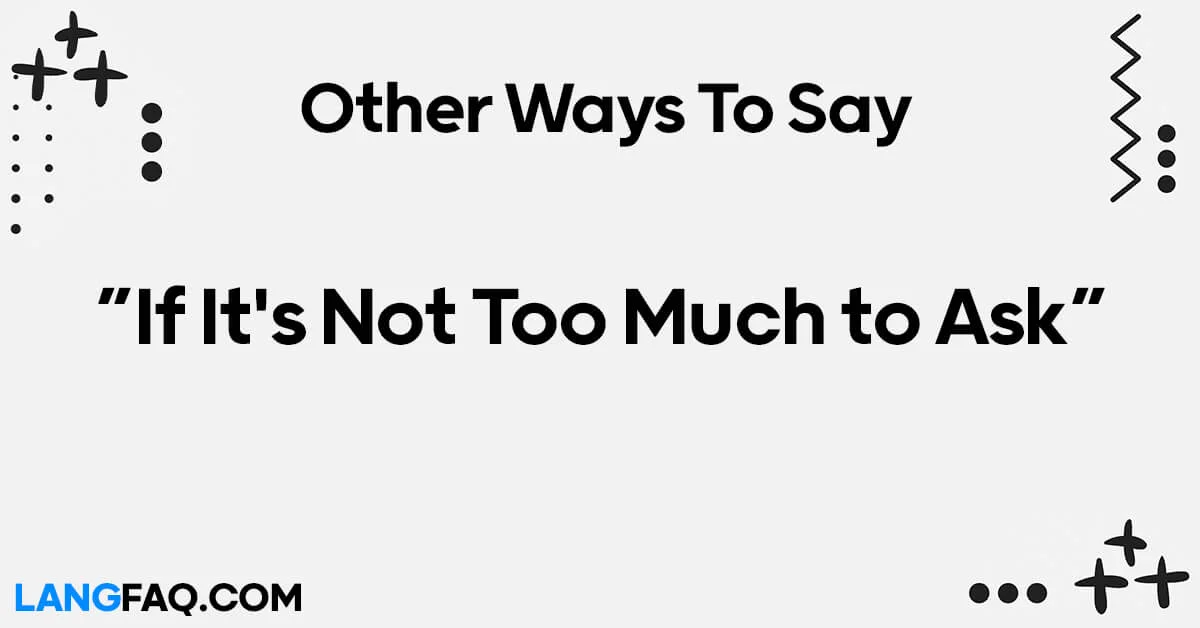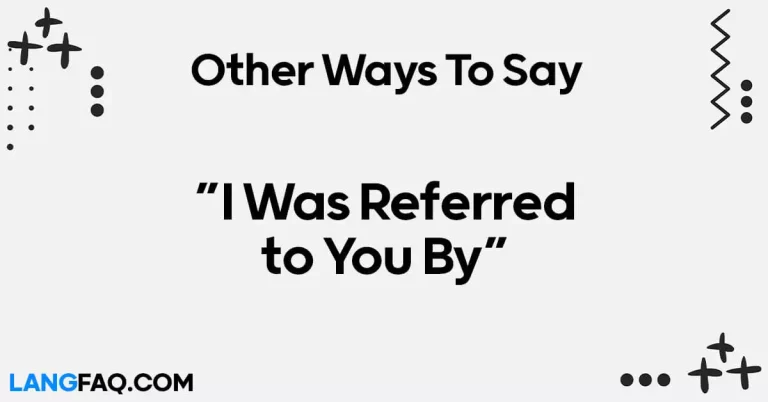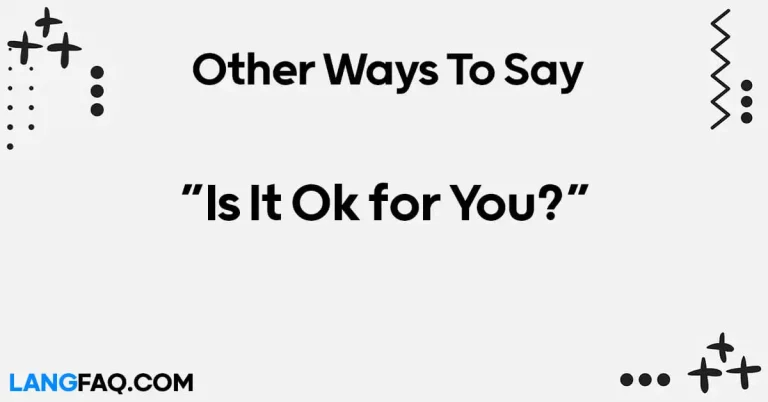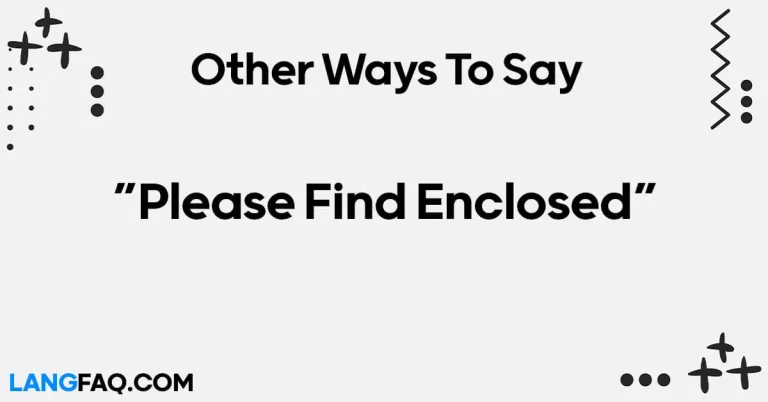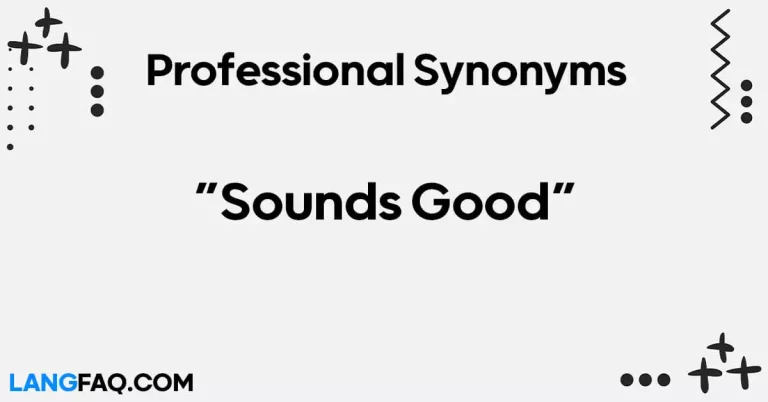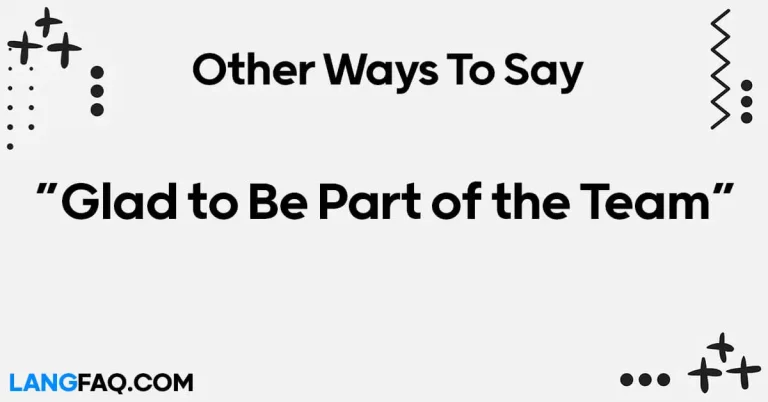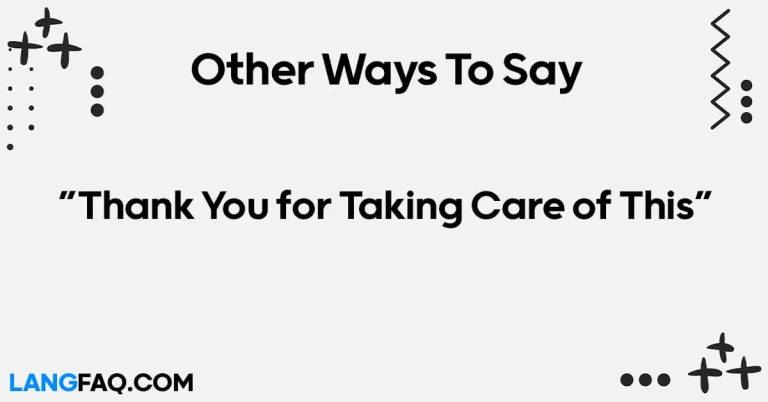In daily interactions, politeness is paramount. Sometimes, we need to make requests without imposing on others. Exploring various ways to phrase the sentiment “If It’s Not Too Much to Ask” can enrich our communication skills and foster better relationships. Here, we unveil 12 alternative expressions to convey this sentiment gracefully.
12 Other Ways to Say “If It’s Not Too Much to Ask”
- Would you kindly
- Could I possibly trouble you to
- Might I inquire if
- Would it be possible for you to
- I hope this isn’t too much of a bother, but
- If it’s convenient for you, could you
- Do you mind if I request
- Is there any chance you could
- May I impose on you to
- I’d be grateful if you could
- Do you think you could possibly
- Could you spare a moment to
| Expression | Meaning | Example |
|---|---|---|
| Would you kindly… | Polite request | Would you kindly pass me the salt? |
| Could I possibly trouble you to… | Asking for a favor | Could I possibly trouble you to pick up some groceries? |
| Might I inquire if… | Polite way to ask a question | Might I inquire if you have a moment to discuss a matter? |
| Would it be possible for you to… | Requesting assistance | Would it be possible for you to help me with this project? |
| I hope this isn’t too much of a bother, but… | Making a request with consideration | I hope this isn’t too much of a bother, but could you proofread my essay? |
| If it’s convenient for you, could you… | Requesting help with acknowledgment of timing | If it’s convenient for you, could you please review this document? |
| Do you mind if I request… | Asking for permission to ask | Do you mind if I request your assistance with this task? |
| Is there any chance you could… | Seeking assistance with possibility assessment | Is there any chance you could give me a ride to the airport? |
| May I impose on you to… | Politely asking for a favor | May I impose on you to watch my dog while I’m away? |
| I’d be grateful if you could… | Expressing gratitude in advance for a favor | I’d be grateful if you could water my plants while I’m on vacation. |
| Do you think you could possibly… | Requesting assistance with uncertainty | Do you think you could possibly lend me your notes for the exam? |
| Could you spare a moment to… | Requesting someone’s time for a brief task | Could you spare a moment to proofread this document for me? |
These alternative expressions offer a variety of polite ways to make requests or ask for assistance without imposing on others. By choosing the right phrase based on the context and relationship, individuals can effectively communicate their needs while maintaining respect and consideration for others’ time and boundaries.
Is It Correct to Say “If It’s Not Too Much to Ask”?
Yes, “If it’s not too much to ask” is a correct phrase to use when making a request, particularly in situations where you want to acknowledge the possibility that the request might be burdensome or inconvenient for the other person. This phrase is often used to soften the request and show consideration for the recipient’s time or effort.
For example, you might say:
“Could you please proofread this document for me, if it’s not too much to ask?” “Would you mind picking up some groceries on your way home, if it’s not too much to ask?”
Using this phrase demonstrates politeness and sensitivity to the other person’s potential limitations or commitments. It shows that you recognize the favor you’re asking for and are willing to accommodate the other person’s circumstances.
Professional Mail Example With “If It’s Not Too Much to Ask”
Subject: Request for Assistance with Project Review
Dear [Recipient’s Name],
I hope this email finds you well. I’m reaching out to request your assistance with an important project we’re currently working on.
If it’s not too much to ask, would you be willing to review the attached project proposal and provide your feedback by the end of the week? Your insights and expertise would be incredibly valuable as we finalize the details and move forward with implementation.
I understand that you have a busy schedule, so please feel free to let me know if you’re unable to accommodate this request. I completely understand if you have prior commitments or other priorities.
Thank you in advance for considering my request. Your support is greatly appreciated, and I look forward to hearing from you soon.
Best regards, [Your Name]
Would you kindly
Meaning and Usage:
“Would you kindly” is a polite phrase used to make a request or ask for assistance in a respectful manner. It acknowledges the recipient’s willingness to help while conveying the speaker’s need.
Example Scenario:
In a formal setting, such as a business meeting, you might use “Would you kindly” to request assistance from a colleague or supervisor.
Example Sentence:
“Would you kindly review the presentation slides before tomorrow’s meeting?”
Email Sample:
Subject: Request for Feedback on Presentation Slides
Dear [Recipient’s Name],
I hope this email finds you well. I am currently finalizing the presentation slides for tomorrow’s meeting, and I would greatly appreciate your expertise and input.
Would you kindly take a moment to review the attached slides and provide any feedback or suggestions you may have? Your insights are invaluable in ensuring that our presentation is polished and effective.
Thank you in advance for your time and assistance.
Best regards, [Your Name]
Variations:
- “Could you please…”
- “I would appreciate it if you could…”
- “May I ask you to…”
Dictionary Insight:
According to the Cambridge Dictionary, “Would you kindly” is a polite way of asking someone to do something.
Pros and Cons:
Pros:
- Conveys politeness and respect
- Acknowledges the recipient’s willingness to help
- Sets a positive tone for the request
Cons:
- May sound overly formal in casual situations
- Can be perceived as too indirect in certain contexts
Usage Tips:
- Use “Would you kindly” in formal or professional settings to maintain professionalism.
- Consider the tone and relationship with the recipient when choosing this phrase.
- Follow up with a clear and specific request to ensure clarity and effectiveness.
Conclusion:
“Would you kindly” is a polite and respectful way to make requests or ask for assistance, particularly in formal or professional contexts. By acknowledging the recipient’s willingness to help, this phrase fosters positive communication and collaboration.
Could I possibly trouble you to
Meaning and Usage:
“Could I possibly trouble you to…” is a polite way to ask for a favor or assistance, acknowledging the potential inconvenience to the recipient.
Example Scenario:
In a workplace setting, you might use this phrase when asking a colleague for assistance with a task that requires their time and effort.
Example Sentence:
“Could I possibly trouble you to proofread this report before the deadline?”
Email Sample:
Subject: Request for Assistance
Dear [Recipient’s Name],
I hope this email finds you well. I am currently finalizing the quarterly report for our team, and I could use your expertise in ensuring its accuracy and clarity.
Could I possibly trouble you to review the report and provide any feedback or corrections you may have? Your insights would greatly contribute to the quality of our final submission.
Thank you for considering my request, and I appreciate your assistance in advance.
Best regards, [Your Name]
Variations:
- “Would it be possible for you to…”
- “Do you think you could possibly…”
- “Might I ask you to…”
Dictionary Insight:
According to Merriam-Webster, “Could I possibly” is a phrase used to ask politely for something or to make a polite suggestion.
Pros and Cons:
Pros:
- Shows consideration for the recipient’s time and effort
- Conveys politeness and humility in making the request
- Acknowledges the potential imposition on the recipient
Cons:
- May sound overly formal in casual or familiar settings
- Could be perceived as indirect or hesitant in certain contexts
Usage Tips:
- Use “Could I possibly trouble you to” when seeking assistance or a favor that may inconvenience the recipient.
- Pair the phrase with a clear and specific request to ensure clarity and effectiveness.
- Consider the recipient’s workload and availability before making the request.
Conclusion:
“Could I possibly trouble you to” is a polite and considerate way to ask for assistance or a favor, acknowledging the potential inconvenience to the recipient. By expressing humility and gratitude, this phrase fosters positive communication and cooperation in various social and professional settings.
Might I inquire if
Meaning and Usage:
“Might I inquire if…” is a polite way to ask a question or request information, showing respect for the recipient’s knowledge or authority.
Example Scenario:
In a formal meeting or interview, you might use this phrase to ask a question of someone in a higher position or with specialized knowledge.
Example Sentence:
“Might I inquire if there are any updates on the project timeline?”
Email Sample:
Subject: Inquiry Regarding Project Status
Dear [Recipient’s Name],
I trust this email finds you well. I am reaching out to inquire about the current status of the project we discussed during our last meeting.
Might I inquire if there have been any developments or updates since our last discussion? Your insights would be greatly appreciated as we move forward with the project.
Thank you for your attention to this matter, and I look forward to hearing from you soon.
Best regards, [Your Name]
Variations:
- “May I ask if…”
- “Could you please provide information on…”
- “I was wondering if you could tell me…”
Dictionary Insight:
According to Oxford Languages, “Might I inquire if” is a formal way of politely asking for information or clarification.
Pros and Cons:
Pros:
- Shows respect for the recipient’s knowledge or authority
- Conveys politeness and professionalism in asking questions
- Allows for a formal and structured approach to inquiries
Cons:
- May sound overly formal in casual or informal settings
- Could be perceived as too indirect in certain contexts, leading to misunderstandings
Usage Tips:
- Use “Might I inquire if” in formal or professional settings to maintain professionalism and respect.
- Frame the question clearly and concisely to ensure the recipient understands the inquiry.
- Follow up with gratitude for any information provided to further foster positive communication.
Conclusion:
“Might I inquire if” is a polite and respectful way to ask questions or request information, particularly in formal or professional settings. By acknowledging the recipient’s expertise or authority, this phrase fosters positive communication and encourages cooperation in seeking knowledge or clarification.
Would it be possible for you to
Meaning and Usage:
“Would it be possible for you to…” is a polite way to make a request or ask for assistance while acknowledging the recipient’s ability to fulfill the request.
Example Scenario:
In a workplace setting, you might use this phrase when asking a colleague for help with a task that requires their expertise or resources.
Example Sentence:
“Would it be possible for you to provide feedback on this proposal by the end of the day?”
Email Sample:
Subject: Request for Feedback on Proposal
Dear [Recipient’s Name],
I hope this email finds you well. I am currently finalizing a proposal for [project name], and I would greatly appreciate your expertise and feedback.
Would it be possible for you to review the attached proposal and provide any suggestions or insights you may have? Your input would be invaluable in ensuring the success of this project.
Thank you for considering my request, and I look forward to hearing from you soon.
Best regards, [Your Name]
Variations:
- “Could you possibly…”
- “Do you think you could…”
- “Is there any chance you could…”
Dictionary Insight:
According to Collins Dictionary, “Would it be possible for you to” is a polite way of asking someone if they can do something.
Pros and Cons:
Pros:
- Shows respect for the recipient’s ability to fulfill the request
- Conveys politeness and consideration for the recipient’s time and effort
- Sets a positive tone for the request, increasing the likelihood of a favorable response
Cons:
- May sound overly formal in casual or familiar settings
- Could be perceived as indirect or hesitant in certain contexts
Usage Tips:
- Use “Would it be possible for you to” when making requests that require the recipient’s assistance or resources.
- Be specific and concise in your request to ensure clarity and effectiveness.
- Follow up with gratitude for any assistance provided to maintain positive communication and foster goodwill.
Conclusion:
“Would it be possible for you to” is a polite and considerate way to make requests or ask for assistance, acknowledging the recipient’s ability to fulfill the request. By expressing respect and gratitude, this phrase fosters positive communication and encourages cooperation in various social and professional settings.
I hope this isn’t too much of a bother, but
Meaning and Usage:
“I hope this isn’t too much of a bother, but…” is a polite way to preface a request, acknowledging the potential inconvenience to the recipient while expressing the speaker’s need.
Example Scenario:
In a casual or informal setting, such as among friends or family, you might use this phrase when asking for a favor or assistance.
Example Sentence:
“I hope this isn’t too much of a bother, but could you help me move some furniture this weekend?”
Email Sample:
Subject: Request for Assistance
Hi [Friend’s Name],
I hope you’re doing well! I hate to impose, but I could really use your help with something.
I hope this isn’t too much of a bother, but would you be able to lend a hand with moving some furniture this weekend? Your help would make a huge difference, and I would be incredibly grateful.
Let me know if you’re available, and we can coordinate the details. Thanks so much for considering my request!
Best, [Your Name]
Variations:
- “I hate to ask, but…”
- “I know this is a lot to ask, but…”
- “I don’t mean to trouble you, but…”
Dictionary Insight:
According to Macmillan Dictionary, “I hope this isn’t too much of a bother, but” is a polite way of asking someone to do something, especially when you know it may cause them inconvenience.
Pros and Cons:
Pros:
- Shows consideration and empathy for the recipient’s potential inconvenience
- Conveys humility and gratitude in making the request
- Establishes a friendly and informal tone, particularly in casual or familiar settings
Cons:
- May be perceived as too indirect or hesitant in formal or professional settings
- Could lead to misunderstandings if the request is not clearly communicated
Usage Tips:
- Use “I hope this isn’t too much of a bother, but” in casual or informal settings among friends, family, or acquaintances.
- Be genuine and sincere in expressing appreciation for the recipient’s assistance.
- Follow up with gratitude and acknowledgment for any help provided to maintain positive relationships.
Conclusion:
“I hope this isn’t too much of a bother, but” is a polite and considerate way to make requests or ask for assistance, particularly in casual or informal settings. By acknowledging the potential inconvenience to the recipient, this phrase fosters positive communication and strengthens relationships based on mutual respect and consideration.
If it’s convenient for you, could you
Meaning and Usage:
“If it’s convenient for you, could you…” is a polite way to make a request while acknowledging the recipient’s schedule or availability.
Example Scenario:
In a professional setting, such as a business email or meeting, you might use this phrase when asking a colleague or supervisor for assistance with a task.
Example Sentence:
“If it’s convenient for you, could you please review the document by the end of the day?”
Email Sample:
Subject: Request for Review
Dear [Recipient’s Name],
I hope you’re having a great day. I’m reaching out to request your assistance with a project we’re working on.
If it’s convenient for you, could you please take a moment to review the attached document? Your feedback and insights would be incredibly valuable as we move forward with this project.
Thank you for considering my request, and please let me know if you have any questions or need further information.
Best regards, [Your Name]
Variations:
- “If it’s not too much trouble, could you…”
- “When you have a moment, could you…”
- “At your earliest convenience, could you…”
Dictionary Insight:
According to Lexico, “If it’s convenient for you” is a polite way of asking someone to do something, emphasizing that it should be done when it suits them.
Pros and Cons:
Pros:
- Shows respect for the recipient’s time and availability
- Conveys politeness and consideration in making the request
- Allows the recipient flexibility in fulfilling the request
Cons:
- May sound overly formal in casual or familiar settings
- Could be perceived as too indirect or passive in certain contexts
Usage Tips:
- Use “If it’s convenient for you, could you” in professional or formal settings to maintain professionalism.
- Be specific about the request and provide any necessary context to ensure clarity.
- Express gratitude for the recipient’s assistance and flexibility in accommodating the request.
Conclusion:
“If it’s convenient for you, could you” is a polite and considerate way to make requests or ask for assistance, particularly in professional or formal settings. By acknowledging the recipient’s schedule and availability, this phrase fosters positive communication and collaboration, allowing both parties to work together effectively.
Do you mind if I request
Meaning and Usage:
“Do you mind if I request…” is a polite way to seek permission before making a request, showing consideration for the recipient’s willingness to assist.
Example Scenario:
In a formal meeting or conversation, you might use this phrase to politely ask for assistance or permission to make a request.
Example Sentence:
“Do you mind if I request your feedback on this proposal?”
Email Sample:
Subject: Seeking Your Input
Dear [Recipient’s Name],
I hope this email finds you well. I wanted to reach out and ask for your expertise on a matter we’ve been discussing.
Do you mind if I request your feedback on the attached proposal? Your insights and input would be invaluable as we finalize our plans.
Thank you for considering my request, and please let me know if you have any questions or concerns.
Best regards, [Your Name]
Variations:
- “Would it be alright if I asked…”
- “Could I trouble you to…”
- “May I request your assistance with…”
Dictionary Insight:
According to Merriam-Webster, “Do you mind if I request” is a polite way of asking someone if they are willing to do something.
Pros and Cons:
Pros:
- Shows respect for the recipient’s willingness to assist
- Conveys politeness and consideration in seeking permission
- Allows the recipient the opportunity to decline if necessary
Cons:
- May sound overly formal in casual or informal settings
- Could be perceived as too indirect or hesitant in certain contexts
Usage Tips:
- Use “Do you mind if I request” in formal or professional settings to maintain professionalism.
- Be clear and specific about the request to ensure clarity and effectiveness.
- Express gratitude for the recipient’s assistance, whether they accept or decline the request.
Conclusion:
“Do you mind if I request” is a polite and respectful way to seek permission before making a request, particularly in formal or professional settings. By acknowledging the recipient’s willingness to assist and allowing them the opportunity to decline if necessary, this phrase fosters positive communication and cooperation in various social and professional contexts.
Is there any chance you could
Meaning and Usage:
“Is there any chance you could…” is a polite way to make a request while acknowledging the possibility of the recipient fulfilling it.
Example Scenario:
In a workplace setting, you might use this phrase when asking a colleague for assistance with a task that may require their specialized skills or resources.
Example Sentence:
“Is there any chance you could help me with this project?”
Email Sample:
Subject: Request for Assistance
Dear [Recipient’s Name],
I hope you’re doing well. I’m reaching out to see if you might be able to lend a hand with something.
Is there any chance you could help me with the upcoming project? Your expertise in [relevant area] would be incredibly valuable, and I believe your input could significantly enhance the project’s success.
Thank you for considering my request, and please let me know if you have any questions or need further information.
Best regards, [Your Name]
Variations:
- “Could you possibly…”
- “Would it be possible for you to…”
- “Do you think you could…”
Dictionary Insight:
According to Lexico, “Is there any chance you could” is a polite way of asking someone if they are able to do something.
Pros and Cons:
Pros:
- Shows respect for the recipient’s ability to fulfill the request
- Conveys politeness and consideration in making the request
- Acknowledges the recipient’s availability and willingness to assist
Cons:
- May sound overly formal in casual or informal settings
- Could be perceived as too indirect or hesitant in certain contexts
Usage Tips:
- Use “Is there any chance you could” when making requests that may require the recipient’s specialized skills or resources.
- Frame the request clearly and concisely to ensure clarity and effectiveness.
- Express gratitude for any assistance provided to maintain positive communication and foster goodwill.
Conclusion:
“Is there any chance you could” is a polite and considerate way to make requests or ask for assistance, particularly in professional or formal settings. By acknowledging the possibility of the recipient fulfilling the request and expressing gratitude for their assistance, this phrase fosters positive communication and collaboration in various social and professional contexts.
May I impose on you to
Meaning and Usage:
“May I impose on you to…” is a polite way to ask for a favor or assistance, acknowledging that the request may inconvenience the recipient.
Example Scenario:
In a formal or professional setting, you might use this phrase when asking a colleague or supervisor for assistance with a task that requires their time or resources.
Example Sentence:
“May I impose on you to review this document before the meeting?”
Email Sample:
Subject: Request for Assistance
Dear [Recipient’s Name],
I hope this email finds you well. I’m writing to seek your assistance with a matter that requires your expertise.
May I impose on you to review the attached document before our upcoming meeting? Your insights and feedback would be invaluable in ensuring its accuracy and effectiveness.
Thank you for considering my request, and please let me know if you have any questions or need further information.
Best regards, [Your Name]
Variations:
- “Could I trouble you to…”
- “Would it be too much to ask for you to…”
- “I hate to ask, but could you…”
Dictionary Insight:
According to Oxford Languages, “May I impose on you to” is a polite way of asking someone if you can ask them to do something, especially if it may cause them inconvenience.
Pros and Cons:
Pros:
- Shows respect for the recipient’s time and effort
- Conveys politeness and consideration in making the request
- Acknowledges the potential imposition on the recipient
Cons:
- May sound overly formal in casual or informal settings
- Could be perceived as too indirect or hesitant in certain contexts
Usage Tips:
- Use “May I impose on you to” when seeking assistance or a favor that may inconvenience the recipient.
- Be clear and specific about the request to ensure clarity and effectiveness.
- Express gratitude for any assistance provided to maintain positive communication and foster goodwill.
I’d be grateful if you could
Meaning and Usage:
“I’d be grateful if you could…” is a polite way to make a request, expressing gratitude in advance for the recipient’s assistance.
Example Scenario:
In a professional or formal setting, such as a business email or meeting, you might use this phrase when asking a colleague or supervisor for help with a task.
Example Sentence:
“I’d be grateful if you could provide your feedback on this proposal by the end of the week.”
Email Sample:
Subject: Request for Feedback
Dear [Recipient’s Name],
I hope this email finds you well. I’m reaching out to request your assistance with a project I’m working on.
I’d be grateful if you could take a moment to review the attached document and provide your feedback. Your insights are invaluable to me, and I greatly appreciate your time and expertise.
Thank you in advance for considering my request, and please let me know if you have any questions or need further information.
Best regards, [Your Name]
Variations:
- “I would appreciate it if you could…”
- “It would mean a lot to me if you could…”
- “Your assistance would be greatly appreciated in…”
Dictionary Insight:
According to Merriam-Webster, “I’d be grateful if you could” is a polite way of asking someone to do something, expressing appreciation in advance for their assistance.
Pros and Cons:
Pros:
- Shows gratitude and appreciation for the recipient’s assistance
- Conveys politeness and consideration in making the request
- Establishes a positive and cooperative tone for the interaction
Cons:
- May sound overly formal in casual or informal settings
- Could be perceived as too indirect or hesitant in certain contexts
Usage Tips:
- Use “I’d be grateful if you could” when making requests that require the recipient’s assistance or expertise.
- Be specific and clear about the request to ensure clarity and effectiveness.
- Express genuine gratitude and appreciation for the recipient’s assistance to foster positive communication and strengthen relationships.
Conclusion:
“I’d be grateful if you could” is a polite and appreciative way to make requests or ask for assistance, particularly in professional or formal settings. By expressing gratitude in advance for the recipient’s assistance, this phrase fosters positive communication and collaboration, enhancing the likelihood of a favorable response.
Do you think you could possibly
Meaning and Usage:
“Do you think you could possibly…” is a polite and tentative way to make a request, allowing the recipient the option to decline if necessary.
Example Scenario:
In a casual or informal setting, such as among friends or family, you might use this phrase when asking for a favor or assistance.
Example Sentence:
“Do you think you could possibly lend me a hand with this task?”
Email Sample:
Subject: Request for Assistance
Hi [Friend’s Name],
I hope you’re doing well. I hate to bother you, but I’m in need of some help with something.
Do you think you could possibly spare some time to lend me a hand with [task]? Your assistance would be greatly appreciated, and I would owe you one!
Let me know if you’re available, and thanks so much for considering my request.
Best, [Your Name]
Variations:
- “Would it be too much to ask if you could…”
- “Could I possibly trouble you to…”
- “I hate to impose, but could you possibly…”
Dictionary Insight:
According to Lexico, “Do you think you could possibly” is a polite way of asking someone if they are able to do something, with an emphasis on the possibility.
Pros and Cons:
Pros:
- Shows consideration for the recipient’s time and availability
- Conveys politeness and tentativeness in making the request
- Allows the recipient the option to decline if necessary
Cons:
- May sound overly hesitant or indirect in certain contexts
- Could be perceived as too formal in casual or familiar settings
Usage Tips:
- Use “Do you think you could possibly” when making requests that may require the recipient’s time or assistance.
- Frame the request clearly and concisely to ensure clarity and effectiveness.
- Be prepared to accept a decline graciously if the recipient is unable to fulfill the request.
Conclusion:
“Do you think you could possibly” is a polite and considerate way to make requests or ask for assistance, particularly in casual or informal settings. By allowing the recipient the option to decline if necessary, this phrase fosters positive communication and respects the recipient’s autonomy and boundaries.
Would you be so kind as to
Meaning and Usage:
“Would you be so kind as to…” is a courteous and formal way to make a request, emphasizing the politeness and respect towards the recipient.
Example Scenario:
In a formal or professional setting, such as a business meeting or email correspondence, you might use this phrase when asking for assistance or a favor.
Example Sentence:
“Would you be so kind as to provide your input on this matter?”
Email Sample:
Subject: Request for Assistance
Dear [Recipient’s Name],
I trust this email finds you well. I’m writing to request your assistance with [task/project].
Would you be so kind as to review the attached document and provide your feedback? Your expertise and insights would be immensely valuable in ensuring the success of this project.
Thank you for considering my request, and please let me know if you have any questions or need further information.
Best regards, [Your Name]
Variations:
- “Could I trouble you to…”
- “Might I ask if you could…”
- “I wonder if you could possibly…”
Dictionary Insight:
According to Oxford Languages, “Would you be so kind as to” is a polite and formal way of asking someone to do something.
Pros and Cons:
Pros:
- Demonstrates respect and courtesy towards the recipient
- Conveys politeness and formality in making the request
- Sets a positive and cooperative tone for the interaction
Cons:
- May sound overly formal or old-fashioned in casual or informal settings
- Could be perceived as too indirect or hesitant in certain contexts
Usage Tips:
- Use “Would you be so kind as to” in formal or professional settings to maintain professionalism and respect.
- Be clear and specific about the request to ensure clarity and effectiveness.
- Express gratitude for any assistance provided to maintain positive communication and foster goodwill.
Conclusion:
“Would you be so kind as to” is a polite and formal way to make requests or ask for assistance, particularly in professional or formal settings. By emphasizing politeness and respect towards the recipient, this phrase fosters positive communication and cooperation, enhancing the likelihood of a favorable response.
Conclusion:
“May I impose on you to” is a polite and considerate way to ask for assistance or a favor, particularly in formal or professional settings. By acknowledging the potential imposition on the recipient and expressing gratitude for their assistance, this phrase fosters positive communication and cooperation in various social and professional contexts.
FAQs
1. How do I politely decline a request? If you need to decline a request politely, express gratitude for the opportunity and provide a brief explanation for why you’re unable to fulfill it. For example, you might say, “Thank you for considering me, but I’m unable to assist at this time due to prior commitments.”
2. Can I use humor when making requests? While humor can lighten the mood, it’s essential to gauge the appropriateness of the situation. In professional settings or formal requests, it’s best to err on the side of caution and maintain a respectful tone.
3. What if I forget to say “please” when making a request? While saying “please” is polite, forgetting it occasionally isn’t necessarily rude. However, incorporating polite language consistently helps foster positive communication habits and demonstrates consideration for others.
4. How can I encourage others to fulfill my requests? Express appreciation for their assistance and acknowledge the effort they’re putting forth. Additionally, offering reciprocal help or expressing gratitude afterward can strengthen relationships and increase the likelihood of future assistance.
5. Is it appropriate to follow up on a request if I haven’t received a response? Yes, it’s acceptable to follow up politely if you haven’t received a response within a reasonable timeframe. Keep your follow-up brief and courteous, expressing understanding for their busy schedule while reiterating the importance of your request.
6. Can I use informal language when making requests to close friends or family? Absolutely! Informal language is often more comfortable and appropriate in personal relationships. However, it’s still essential to maintain respect and consideration for the other person’s feelings and boundaries.
Conclusion
Mastering the art of making requests politely is essential for effective communication. By understanding various alternatives and their appropriate usage, individuals can navigate diverse social and professional settings with ease.

